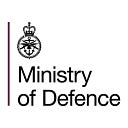
Leading the first reservist company for Op Interflex
During Major Rawji’s 15 year career as an Army Reservist he has served in Afghanistan, East Africa and the broader Middle East Region, but it is Operation Interflex — the UK-led military training for Ukrainians — that he describes as the most important mobilisation the UK has witnessed in years.
26th June 2023 marks the one year anniversary of Operation Interflex, which has to date trained more than 17,000 Ukrainian recruits. The UK government hopes to train 30,000 by the end of 2023. Nine partner nations are working with the UK to deliver this vital training to teach Ukrainian volunteers how to survive and be lethal. Over 1,000 military personnel are mobilised for the training, and in June 2023 a full Army Reserves unit was mobilised for the first time.
Major Rawji is the officer commanding Trident Company, the first full Army Reserves unit deployed on Operation Interflex. Here Major Rawji talks about why he volunteered for this mission, his experiences of leading a mixed company and training Ukrainians.
Why did you volunteer for Op Interflex?
This is one of the most important mobilisations we’ve seen in years. This is our contribution to supporting our Ukrainian counterparts. So, yes, absolutely I was a volunteer for this mission.
How important is it for Reservists to have a role in Op Interflex?
Its pivotal. We contribute to the whole force and this is the reason why reserves are the reserves: we are supporting our regular force and demonstrating the diversity the Reserves bring. We are supporting. We are enabling. We’re delivering. And it just goes to show that we have mobilised two sub-units for this. One of them is ours Trident Company. Reservists are always ready to contribute to Defence, whatever the mission is — from conflict to peace time — we are there.
You have a civilian day job also in uniform?
Yes I do. I am a firefighter in West Midlands Fire Service. I hold a supervisory role as a crew commander. So effectively that is being a 2IC (in Army terms) of a seven person team. There is synergy with the Fire Service and the Army.
There’s pressures you go through on a day-to-day basis. Rescuing people, humanitarian elements, environmental work, emotional intelligence, long hours, prevention work, protection work on buildings and most importantly responding, so it’s absolutely varied. So that’s what I do in the daytime and coming out to do this it just makes sense, as I can bring those skills into this role as well. Bringing that practicality, the pragmatic thought, in being able to deal with pressurised situations. And bringing solutions to something that’s complex. It all works pretty well.




You are using civilian Ukrainian translators as part of the training delivery, how are you finding that?
It’s been really good. Linguists are our centre of gravity here. Without them we would struggle to fulfil our mission. That cooperation, the integration is key.
Most of them are from Ukraine. So there’s that purpose for them: they are also helping to defeat Russia by providing the assistance and delivery. Working with them has been an absolute privilege and has been really humbling. They want to be here, which is the most important thing.
I’ve worked with interpreters in Afghanistan, Africa and the broader Middle East region.
It’s great to see the differing styles and cultures that linguists bring from war to peace time. What I’ve found as a common denominator is that they want to be there and also we need to make sure we understand them, their culture, their differences and work life balance.

And how is it training the Ukrainians?
Yesterday, we heard vignettes from the front line and the Ukrainians volunteered to tell us about the experiences and it’s been hair-raising to say the least. It just brings it home as to what they’re going through and brings the importance of what we do.
They’ve been absolutely humble. They’ve been forward leaning. They’ve been volunteering for more, they want to challenge themselves.
So it’s been absolutely humbling. It’s been a privilege.
You are a proud Mercian and a Company of Mercian regulars were one of the first companies to be involved in training the Ukrainians. How does it feel as a Mercian to be commanding a mixed company of cap badges on the first fully reservist led Op Interflex?
Everyone you speak to is humbled and fulfilled by what they’re doing here on Op Interflex. No-one here doesn’t want to be here. That goes for regular and reserve across the board.
We’ve had no people thinking this is terrible because there’s that tangible output, we are physically seeing those people who have been to war which is emotional as well.
I have seven different units — mix of engineers, REME, Yeomanry and Infantry, the majority infantry. It is an absolute pleasure to be commanding these troops. And I’m already a bit sad about the time when the end of the tasking comes that this will come to an end, because it’s an absolute privilege commanding troops and influencing and shaping the way that they deliver for something that is so, so important.
I have been taken aback by what these different cap badges bring, not necessary from an infantry perspective, but the other sort of diverse skill sets that bring from their cap badge and their civilian employment.
